Intriguing insights into how a biblical verse suggests our moral duty towards animals, promising to transform your perception of the animal kingdom.
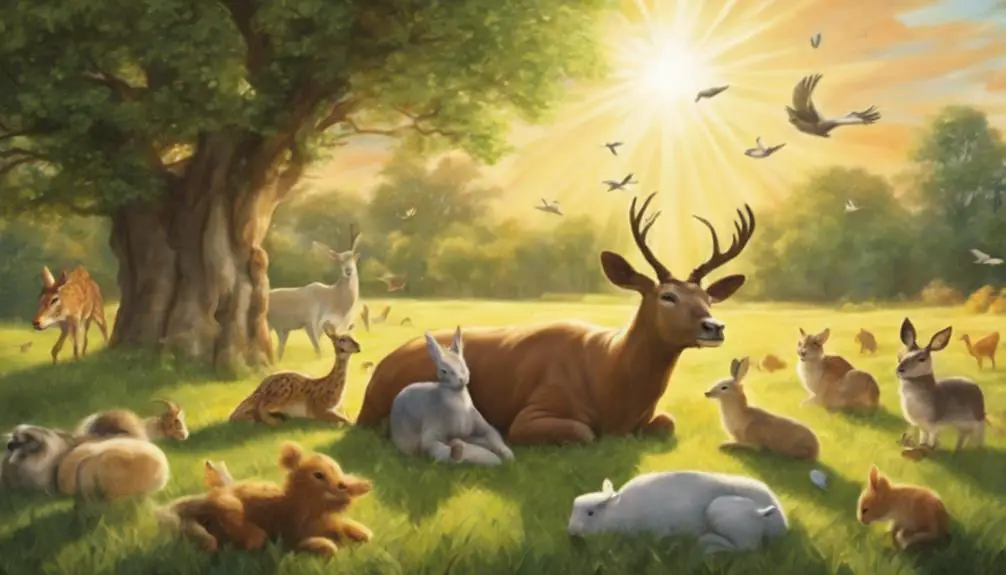
A Bible Verse About Animals
In the stillness of a church and the wild heart of a forest, you may find an unexpected connection. The Bible, an ancient text, is not silent about the creatures that roam our world. Take Proverbs 12:10 for instance, 'A righteous man cares for the needs of his animal…'
What could this verse be suggesting about our relationship with animals and our moral obligations? Let's unpack this, and you might find that these biblical considerations could reshape your perception of the animal kingdom.
Key Takeaways
- Animals in the Bible serve as metaphors, embodying spiritual truths and imparting wisdom through tangible forms.
- The creation story in Genesis emphasizes animals' integral role in existence and humanity's stewardship over them.
- Noah's Ark highlights the shared destiny of humans and animals, challenging anthropocentric views.
- Jesus's parables frequently use animals to provide unique insights into spiritual truths and divine principles.
Understanding Biblical Symbolism of Animals
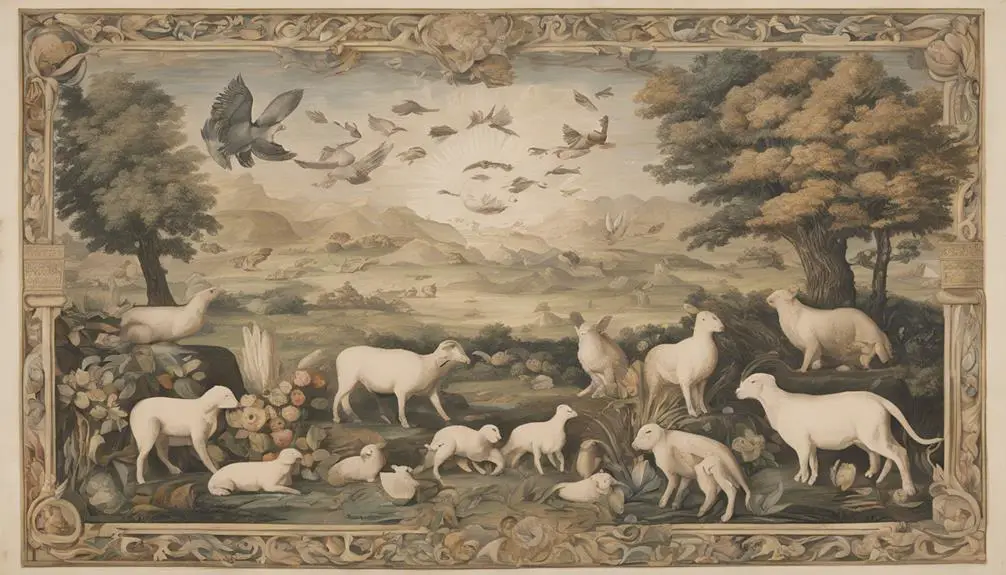
In interpreting biblical narratives, one must consider the profound symbolism animals often represent, serving as metaphors that enrich the text and deepen theological understanding. You'll find, for instance, that the lamb is often used to symbolize innocence and sacrificial love, as seen in the Passover narrative and the reference to Jesus as the 'Lamb of God'. The dove, on the other hand, embodies peace and the Holy Spirit, as depicted during Jesus' baptism.
Though these metaphors are clear, others are subtler and demand careful analysis. The serpent in Genesis is a prime example, often misinterpreted as merely personifying evil. In the ancient Near East, however, serpents were symbols of wisdom, fertility, and immortality, suggesting a more nuanced interpretation of the temptation story.
The eagle, representing strength and renewal, is similarly insightful. In Isaiah 40:31, for instance, those who hope in the Lord are said to 'soar on wings like eagles', a metaphor for spiritual resilience and renewal.
Therefore, understanding animal symbolism isn't just about identifying metaphorical meanings, but also about appreciating the cultural and historical contexts in which these narratives were written. This awareness enriches one's reading of biblical texts, leading to a more nuanced theological understanding.
Proverbs: Wisdom Through Creatures
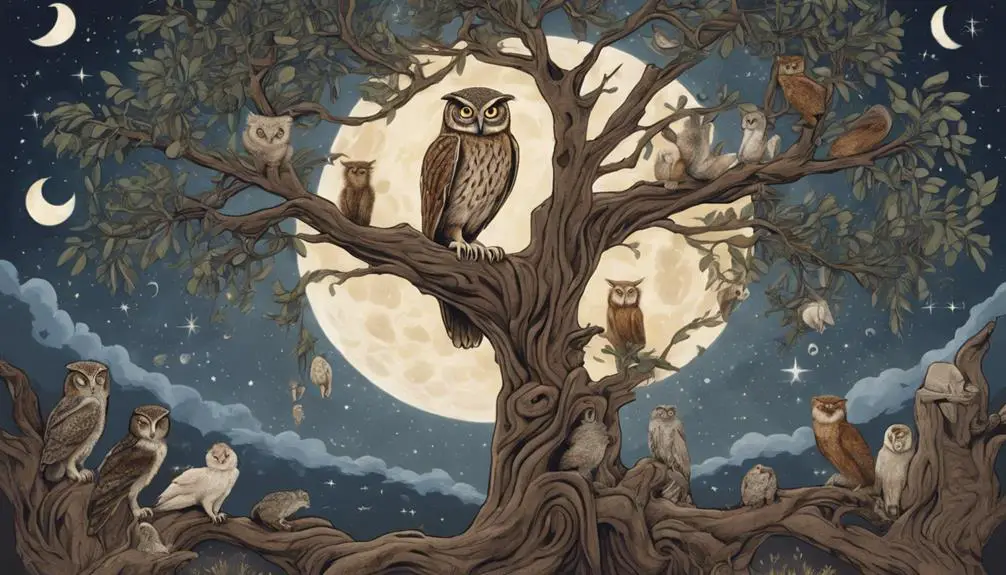
Shifting our focus to the wisdom literature of the Bible, you'll notice that the book of Proverbs extensively uses creatures as metaphors to impart wisdom and understanding. This is not only a poetic tool, but also a way to convey complex ideas in a relatable manner.
Let's dissect three examples to appreciate the depth of this metaphorical approach. The table below outlines each verse, the creature mentioned, and the wisdom it imparts:
Verse |
Creature |
Wisdom |
|---|---|---|
Proverbs 6:6 |
Ant |
The ant's industriousness illustrates the virtue of diligence and the folly of laziness. |
Proverbs 30:25 |
Ants |
Despite their physical weakness, ants' preparation for the future teaches the importance of foresight and planning. |
Proverbs 14:12 |
Way that seems right |
This is compared to a beast's path leading to death, warning about self-deception and the need for divine guidance. |
Through these examples, you'll see how Proverbs utilizes animals to encapsulate wisdom in a tangible form. This not only enhances the relatability of the teachings but also underlines the interconnectedness of all God's creations, further emphasizing the divine wisdom inherent in nature.
Genesis: The Creation of Animals
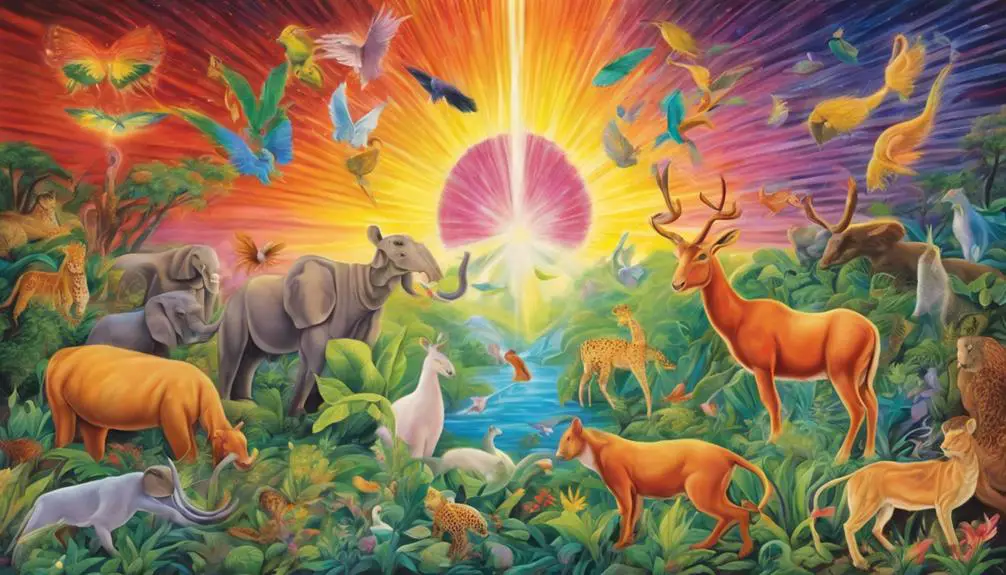
Diving into the book of Genesis, you'll encounter the divine narrative of animals' creation, a seminal event that underscores their integral role in the grand scheme of existence. The creation of animals is beautifully depicted in Genesis 1:24-25, where God speaks them into existence, each according to their kind. Here, 'kind' reflects a broad category, implying an array of diverse species, each with distinct traits and behaviors, yet all sharing a fundamental, God-given life force.
Genesis's narrative doesn't stop at mere creation; it further elevates animals by granting them the earth as their habitat. This act denotes a sense of ownership and stewardship, reinforcing the symbiotic relationship between the earth and its inhabitants. You'll also note the recurring motif of God seeing his creation as 'good', a divine seal of approval, emphasizing the inherent value and worth of animals.
Moreover, Genesis 1:26-28 outlines humanity's dominion over animals, a controversial verse often misinterpreted as a carte blanche for exploitation. However, a closer look reveals it's more about responsibility than dominance. The original Hebrew word 'radah' suggests 'stewardship' or 'benevolent rule', urging us to respect, protect, and care for our fellow creatures.
Lessons From Noah's Ark
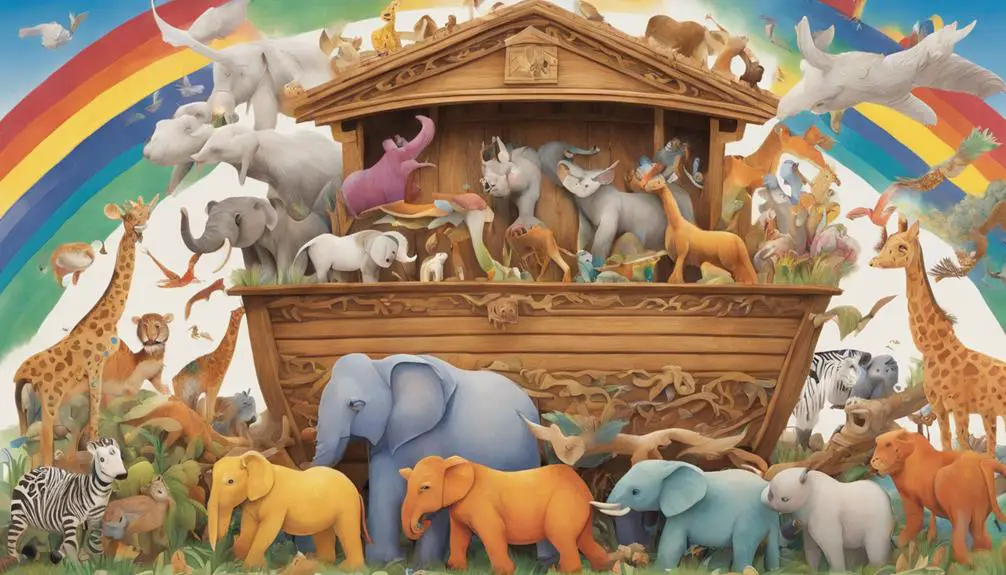
Leaving the narrative of creation behind, you find another compelling testament to the significance of animals in the biblical story of Noah's Ark. This tale introduces a more complex relationship between humans and animals, one defined by stewardship and survival. It's not simply about the preservation of life, but also about the inherent value of each creature.
In Genesis 6:19-20, Noah is instructed to bring into the Ark 'two of every sort' to keep them alive. This divine mandate underscores the responsibility humans have towards animals, a theme that's prevalent throughout the Bible. Here, animals aren't mere subsistence resources, but integral components of creation to be preserved.
Moreover, the Ark, often viewed as a symbol of salvation, represents a shared destiny for humans and animals. Both are victims of the Flood, and both are partakers in the divine plan for survival. This interconnectedness suggests a mutual dependence and respect, challenging the anthropocentric view of the world.
Animals in Jesus's Parables
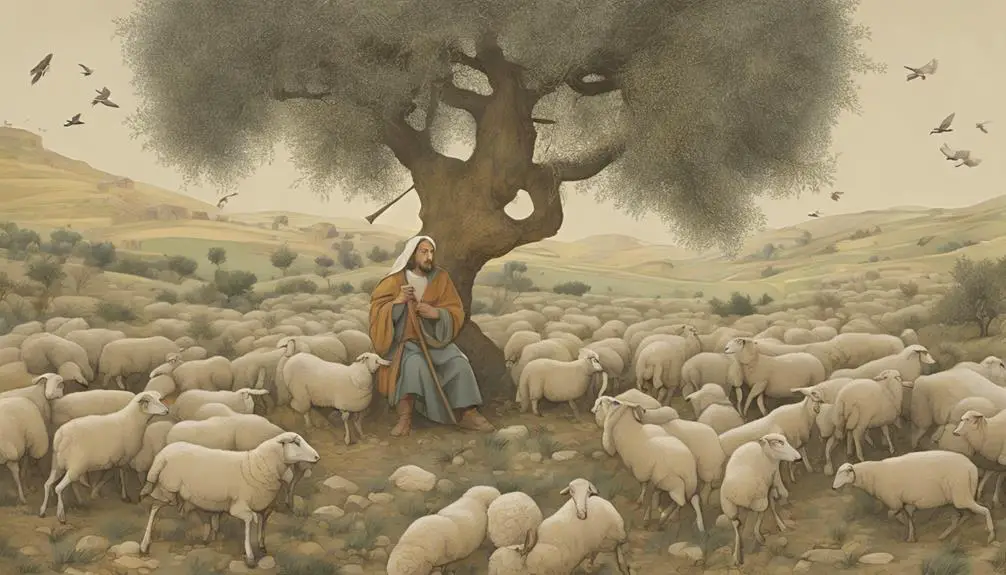
In the parables told by Jesus, animals often play significant roles, serving as powerful metaphors that embody spiritual truths and moral lessons. You'll find that these animal characters illustrate human characteristics and behaviors, bringing divine wisdom into concrete, understandable stories.
Take, for example, the parable of the lost sheep. This tale features a shepherd who leaves his ninety-nine sheep in search of one lost lamb, symbolizing God's relentless pursuit of those who've strayed from His path. The sheep are, in essence, us – prone to wander and yet relentlessly sought after by a loving shepherd.
Or consider the parable of the unclean spirit, where Jesus describes an unclean spirit as a restless animal searching for a home, providing a vivid image of the destructive nature of evil.
In Jesus's parable of the sower, birds swoop down to snatch away the seeds that fall on the path, symbolizing the devil stealing the word of God from those who fail to understand it.
As you delve into these parables, you'll find that the animal characters aren't merely narrative devices, but deeply symbolic entities that provide a unique lens to explore profound spiritual truths.
Conclusion
In conclusion, you've seen the rich symbolism and profound wisdom animals hold in the Bible. From the creation narrative in Genesis to the parables of Jesus, animals serve as powerful teaching tools.
The lessons from Noah's Ark, and the insights gleaned from Proverbs' creatures, all underline the value and respect given to animals. Delving into this topic, you've deepened your understanding of the Bible's multifaceted teachings about animals.


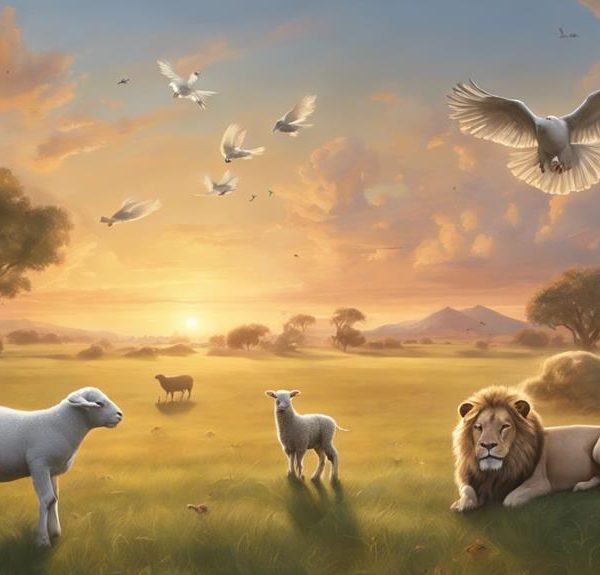
Sign up